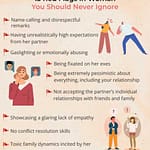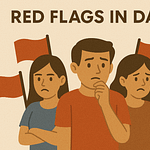💔
The dating landscape has changed dramatically in recent years, and it continues to evolve rapidly in 2024. With the rise of dating apps, shifting social expectations, and growing concerns around emotional well-being, knowing how to spot red flags early in a relationship is more important than ever. Recognizing harmful patterns can save time, protect your mental health, and help you build healthier connections.
1. The Rise of Online Dating 📲
In 2024, online dating is still the dominant way people meet partners. Apps like Hinge, Bumble, and Tinder remain popular, with newcomers entering the scene offering niche experiences. According to recent statistics, over 60% of singles aged 20 to 40 have used a dating app in the last year. While these platforms offer convenience, they also introduce new challenges—like screening for authenticity and intentions.
2. Common Modern Dating Red Flags 🚩
A. Inconsistent Communication 📉
If someone regularly disappears for days without explanation or frequently changes behavior or tone, it may indicate a lack of genuine interest or emotional availability. One clear red flag is breadcrumbing—sending occasional flirtatious messages to keep you interested with no real intention of building a relationship. Ghosting, where a person abruptly cuts off all communication, is still common in 2024 and often signals emotional immaturity or avoidance.
B. Social Media Obsession 📸
Many individuals heavily curate their online image. If your date is more focused on how the relationship looks online rather than how it feels in reality, it could be cause for concern. Constant selfies, public displays meant for followers, or pressure to share intimate moments on social platforms can mask insecurities or an unhealthy need for external validation.
C. Avoidance of Personal Topics 🕵️♂️
Reluctance to share basic personal information—such as job status, family dynamics, or long-term goals—can point to deeper issues. Whether it’s hiding something or simply a lack of readiness, vagueness about one’s life or future can prevent emotional intimacy. Open conversations about values, ambitions, and relationship intentions are essential for meaningful connections.
D. Fast-Paced Relationships ⚡
If someone rushes into deep commitment—like calling you “the one” after two dates or talking about moving in together right away—it may seem flattering, but it can also be a tactic to create false intimacy. Genuine connection takes time. Fast-tracking a relationship without building trust first can lead to unhealthy dynamics and potential heartbreak.
E. Commitment Issues ❗
If you notice a person avoids labeling the relationship, makes jokes about commitment, or frequently talks about past short-lived relationships, this could point to a fear of emotional attachment. Continually making excuses for why the relationship can’t progress is a strong indicator they may not be emotionally ready or willing to make things serious.
F. Lack of Respect for Boundaries 🚷
Healthy relationships involve mutual respect for space and boundaries. If someone constantly wants your attention, gets upset when you spend time with others, or pressures you into activities you’re not comfortable with, these actions undermine your autonomy. Disregard for privacy—like going through your phone or discouraging time with friends—is a glaring red flag.
3. Psychological Manipulation Tactics 💣
Gaslighting is one of the most dangerous red flags in modern relationships. It involves making a partner question their reality—telling them they are overreacting or imagining things when bringing up valid concerns. Over time, it erodes confidence and causes emotional distress.
Love bombing is another manipulation tactic to watch for. It often includes excessive compliments, gifts, and declarations early on. While it might feel like intense affection, it often serves to quickly establish control or dependency. Once the other person feels emotionally invested, the loving behaviors often turn cold or controlling.
4. Financial Transparency 💸
Open conversations about money are an important part of modern relationships. If someone avoids talking about their job, debts, or financial habits—or if they frequently borrow money with vague promises to repay—it could signal more serious issues. Financial instability doesn’t automatically disqualify someone from being a good partner. However, deception or secrecy in this area can cause future hardship and distrust.
5. Navigating Cultural and Ethical Differences 🌍
Dating across cultures and backgrounds is more common than ever. While these differences can enrich relationships, unaddressed misunderstandings can lead to tension. If someone devalues your beliefs, refuses to understand your traditions, or expects you to change your ethics without dialogue, it’s a sign of disregard. Relationships require mutual respect, and being open to learning from each other is a vital foundation.
6. Tools and Strategies for Identifying Red Flags 🛠️
Asking the right questions early on can save a lot of time and heartache. Instead of scripting ideal answers, pay attention to how people respond naturally. Ask about past relationship patterns, long-term goals, and conflict resolution styles. Observe actions over time—do their behaviors align with their words?
Most dating apps now include safety features such as video chat before meeting and profile verification. Make use of these tools to confirm identity and intentions. Also, discuss new connections with trusted friends. Sometimes, outsiders can spot warning signs more clearly than we can when emotions are involved.
Conclusion ✅
Recognizing modern dating red flags in 2024 is about being alert, not paranoid. It’s understanding that healthy relationships feel safe, respectful, and mutually supportive. If you notice inconsistent behavior, a lack of openness, or controlling tendencies, listen to your instincts. Red flags are warning signals. Don’t ignore them in the hope things will improve later. Prioritize your well-being. The right relationship won’t leave you feeling anxious or questioning your worth.
Additional Resources 📚
- Book: Attached by Amir Levine and Rachel Heller
- Podcast: The Love Drive by Shaun Galanos
- Counseling Support: BetterHelp.com, TherapyForBlackGirls.com
- Safety Tips: Match Group’s Safer Dating Guide
“`



